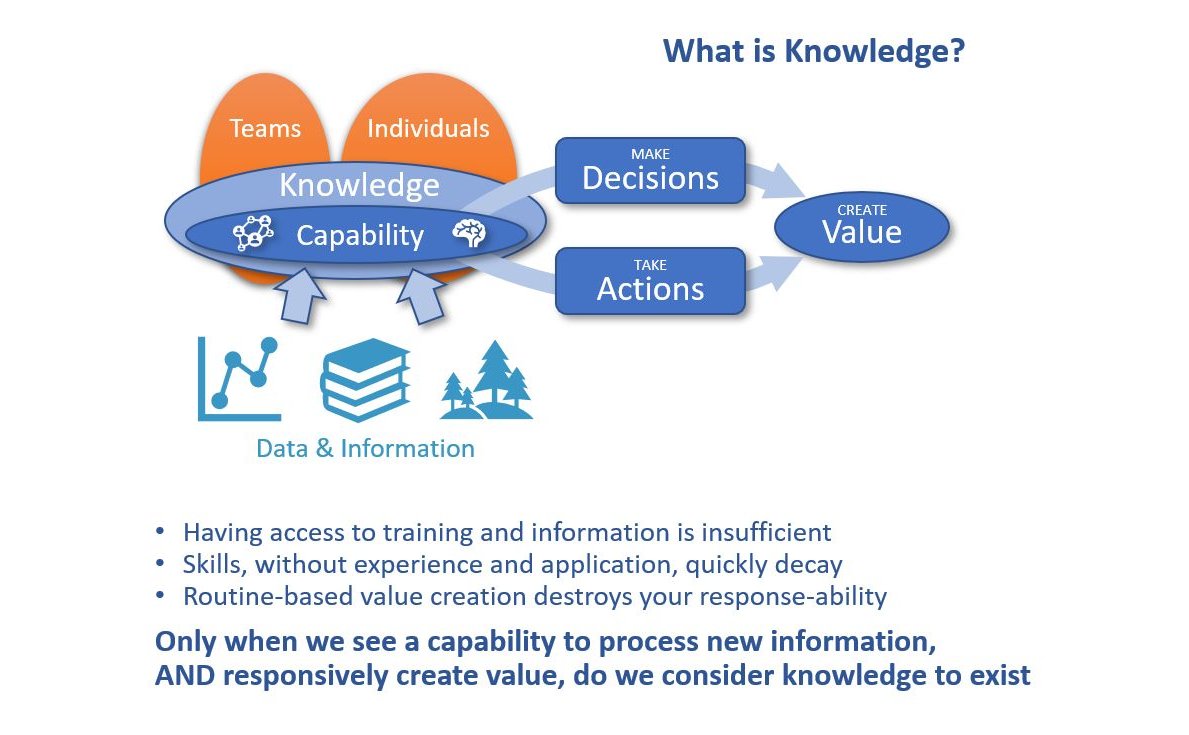
Knowledge Value Framework for executives
Many knowledge managers believe that explaining the foundations of cognitive science and knowledge to managers and leaders is necessary to gain buy-in for knowledge programs in organisations. However, this is an error. When people visit a GP, it is not necessary to understand how the diagnosis was reached; only why there is a problem and the clear and actionable steps required to address it.
First we must help non-KM leaders understand why they would even care about learning in the first place. Most of the MBA students I teach would say it’s all about hiring. You just hire a great person and they will magically know all the right decisions to make. If something or somebody fails it’s because we hired the wrong person. They weren’t the messiah, they were just a naughty boy. NEXT!
At the opposite extreme are those managers who see the knowledge problem (Bravo!) but think it can be solved by better IT systems and application of AI. There is some absolutely fantastic work being done by Microsoft Cortex, Sidekick and Facebook Workplace in these areas and I applaud them, but they are information solutions, not knowledge ones, regardless of what they call themselves. In the end, the actions our people take will, at best, just be influenced by them. We need the knowledge capability to use and apply their outputs.
Executives need to realise that results come from teams of people making good decisions based on (yes, the knowledge and experience they bring, but also) their access to data and information to make sense of the problems they are trying to solve. Magical thinking pervades too much of what counts as management these days, and I have had to find ways to break down that myth. It’s not their fault. I lectured MBA level KM for several years and had to spend the first three weeks of each course undoing their beliefs that people are simply little robots operating in a budget-motivated power-economy.
We have a strong foundation for knowledge management, and the case for KM in a post-COVID world is stronger than ever. Our community relies upon many esoteric concepts and lots of jargon so I have developed a Knowledge Value Framework that expressly leaves out both the cognitive and collective intelligence pieces (including sense-making, knowledge transfer and lessons management systems), instead wrapping them in the fuzzy “Capability” black box.
In my experience, every attempt at going one level deeper too early resulted in the model being too complicated to absorb by today’s managers and CEOs. That may change some day but for now we need to meet them where they are at. By focusing on what is essential in any explanation about the touch-points between knowledge and value, the elevator pitch I came up with was:
Knowledge is the capability of an individual or team to process new information and data
then make decisions and take actions that create value.
When framed in this way, suddenly the levers and metrics of knowledge management become clear even to non KM leaders:
- Increase the quality, access and discoverability of contextual information
- Improve and share the ability of individuals and/or teams to make sense of the information available to it
- Maintain a rigorous focus on intelligent, evidence driven decision making that leads to stakeholder value at all levels
That is the focus of a strong knowledge program. Miss any one of those three things and you are just treading water.
The additional statements in the Framework relate to how to managers can treat knowledge as an asset through investment and active management. Many organisations fail to link the pieces of their knowledge solution together, leading to fleeting success that cannot be sustained once staff move on. With these three key guidelines, managers are given a tangible set of principles for designing their own knowledge programs:
- Mere access to training and information is insufficient
- Skills, without experience and application, quickly decay
- Routine-based value creation destroys your organisation’s response-ability
I find this Framework to be a great tool to explain why knowledge programs matter and are not just solutions searching for a problem. For example, if you can show that a lessons program overcomes the individual-to-team problem of knowledge transfer but that this only works if the result ends in value being created, then you avoid the problem of a process that leads to lessons identified but not learned.
How are you educating your management team to understand the power of a knowledge program?


![Collaborating on Research by National Eye Institute [Flickr image]](https://realkm.com/wp-content/uploads/2018/07/9955278615_c5356cdffd_z.jpg)




Great Article